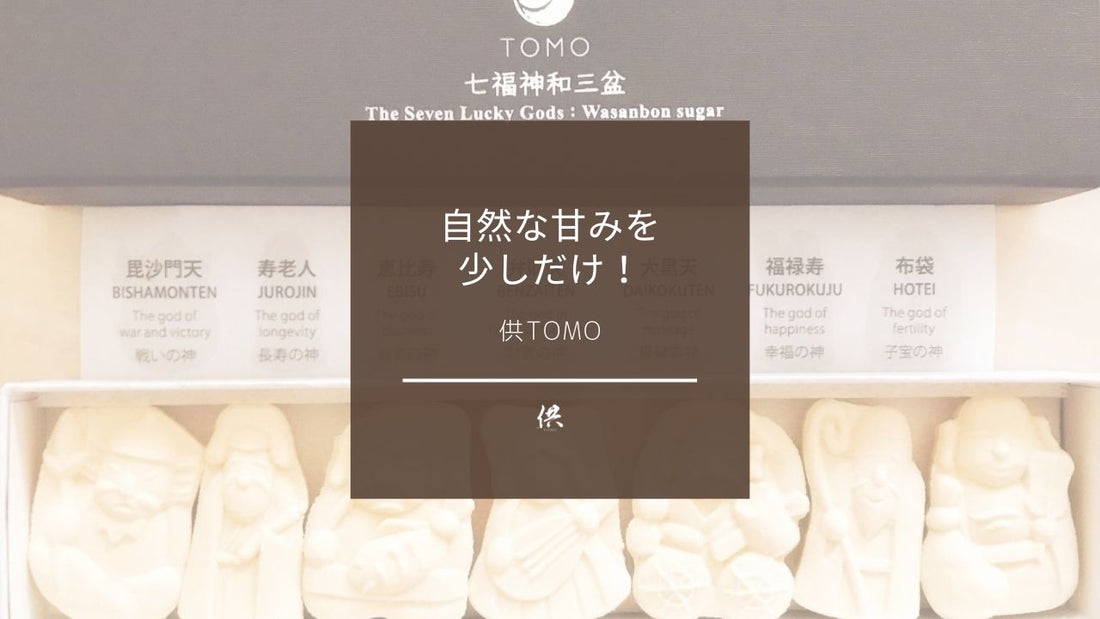
How Japan Have Been Using Sugar as a Gift
Outside of worldwide known gifts day (Valentine day, Mother’s day, Christmas, etc.), Japan has lots of other gift-giving occasions, such as the o-chugen period (July 1st to July 15th) and o-seibo in winter. Japanese people often send sweets as a gift.
In the past, seaweed, dried bonito flakes, somen noodles or canned food with white sugar were used for gifts. Sugar was a precious commodity. Nowadays, sugar in Japan is still one of the most popular gifts, but it is offered in different forms: cakes, cookies, etc.
Tasty foods are mostly sweet, and sugar has long been used as a "medicine" to get energy and cure illness.
In Europe, the use of white sugar was monopolized by the upper classes, and was therefore admired by the general public.

Sugar in Japan after World War II
After World War II, food was scarce in Japan. Children were cheered up by chocolates and caramels distributed by the U.S. occupying forces.
The taste of sugar is both fascinating and addicting.
Sugar is quickly absorbed through the mucous membranes of the mouth, raising both your energy and blood sugar level. This is why it is not recommended for people with high blood sugar levels.
Limited in calories, artificial sweeteners appeared as a miracle solution for those in search of sugar.
The Emergence of Artificial Sweeteners in Japan and Their Usage
Artificial sweeteners currently approved as food additives include:
Saccharin
Aspartame
Glycyrrhizic acid
D-sorbitol
D-xylitol
Sucralose
Acesulfame K (potassium),
and more.
You can tell if any of these artificial sweeteners are added by looking at the back of the package of bottled beverages or processed foods. However, you cannot know the amount.
Do Artificial Sweeteners Affect Liver Function?
Artificial sweeteners are not also metabolized in the body, and they are considered as "foreign substances".
The liver has many functions, including sorting and discarding substances that are harmful to our body.

Excessive intake of artificial sweeteners can overload the detoxification process, and the ability of the liver to eliminate other wastes, chemicals, and toxins.
Artificial sweeteners are often described as having "no calories" because they are not metabolized by the body. However, it is also important to keep in mind they also put a burden on the liver.
There are also artificial sweeteners that are hundreds of times sweeter than sugar and can increase your desire for it. Consequently, even if you consume artificial sweeteners, it will be difficult to break free from a sweetness addiction.
“Low calories” and Artificial Sweeteners: Be Careful of the Trap
Artificial sweeteners have an impact on the liver, and we don’t know their connection with carcinogenicity, which is still under study. If you are craving sugar, it is safer for your body (and more satisfying) to eat a small amount of sweets made with natural sugar.
Being focused only on calories is not healthy: you might then not get the nutrients essential for your survival, and you will end up only eating chemically synthesized additives that are not metabolized by your body.
We should try to curb our cravings for sweetness as much as possible. If you have a craving, you should try sweets made from natural sugar, honey or starch syrup.
A Smart Choice For Sweets Cravings: Japanese Wasanbon Sugar
TOMO Shichifukujin wasanbon (Seven Lucky Gods Shaped Wasanbon Sugars) are smooth sugars that contain minerals. They are made by a traditional method that has been handed down since the Edo period (1603-1868) in Japan.
These traditional wagashi are produced from a special type of sugar cane called chikusha, which grows on the Shikoku island.
With their original and traditional Japanese shape, TOMO Wasanbon sugars are a popular gift in Japan and they are becoming trendy in the U.S on Amazon.
The Best Traditional Japanese Sweetener For Your Drinks!
Even if you like to drink your coffee or tea without sugar, there is nothing wrong with adding a touch of sweetness sometimes! However, it is best to pick natural sugars rather than being tempted by artificial sweeteners, even if they are described as "low calorie".
This is one of the drawbacks with bitter and astringent drinks: they are often difficult to consume without sugar.
Compared to coffee, Café Genshin (roasted brown rice coffee) has a much lower bitterness and astringency. You can easily drink it unsweetened, but if needed, you can add a little bit of wasanbon or Japanese kuromitsu syrup.
Just because you want to take care of your health doesn't mean you can't enjoy yourself!
*****
If you enjoyed this article, you can read:
How to Deal With Caffeine Sensitivity and How to Simply Treat It
Try this simple hack to preserve your vascular age for a younger look and healthier lifestyle!
The Incredible Story of Caffeine Culture - You'll NEVER Guess Where It Started!
Discover "on-katsu", the Japanese art of warming up your body
An easy introduction to face yoga, the Japanese art of yoga for the face
Mindfulness and Shrines (part 2) - Principles and fundamentals of mindfulness
How to balance your overconsumption of caffeine with this Japanese trick
List of the 5 Best Japanese Alternative To Coffee (Caffeine Free And With Caffeine)



